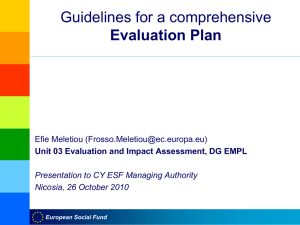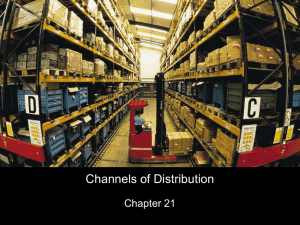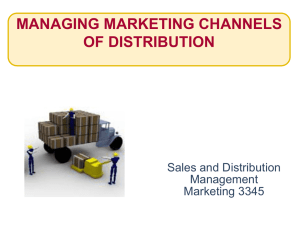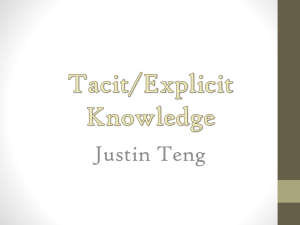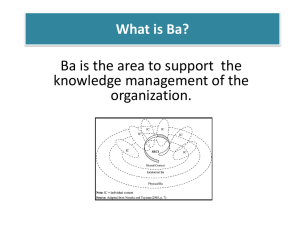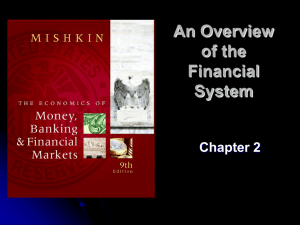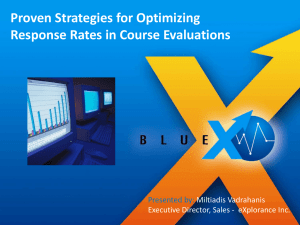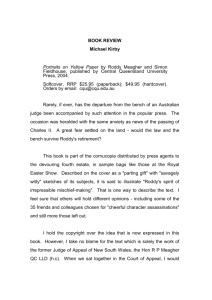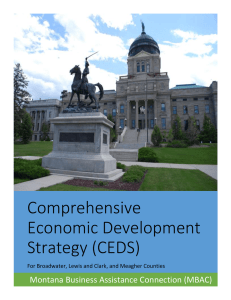Dr Laura Meagher, University of Edinburgh (PowerPoint
advertisement
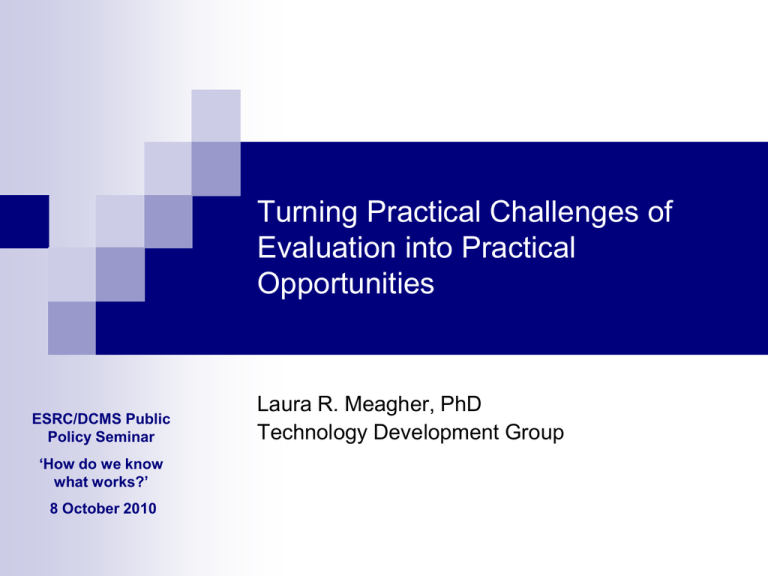
Turning Practical Challenges of Evaluation into Practical Opportunities ESRC/DCMS Public Policy Seminar ‘How do we know what works?’ 8 October 2010 Laura R. Meagher, PhD Technology Development Group Outline Introduction Twofold Challenges Premises & Approach Flows & Processes Categories of Impacts Example: Distribution of Impact Categories Example: Timing of Impacts Capturing Tacit Knowledge about Processes Some Key Factors Example: Practical Use of Evaluation Findings Conclusions Laura Meagher Technology Development Group Honorary Fellow, ESRC Innogen Centre, University of Edinburgh PhD natural sciences, 25 years’ experience in US and UK science, innovation, economic development, strategic change Design, catalysis & leadership for novel initiatives and strategic alliances across disciplines, institutions & sectors, knowledge exchange Evaluation Introduction Why evaluate? -Accountability -Learning Making evaluations “strategically useful” Analogies between evaluations of societal impacts of research and evaluations of impacts of policies Twofold Challenges Increasing demand for impacts as (research) ‘Return On Investment’ Challenges of capturing benefits “impacts” can be subtle & elusive, diffuse many impacts are likely to be long-term, taking place in various forms at multiple levels, various times attribution of causality is a nightmare Challenges of generating benefits actual (KE) processes can be subtle & elusive improvement of (KE) processes requires attitudinal & behavioural changes at multiple levels Evaluation can meet demands for accountability…. and more Synthesis & Robust Triangulation Multiple perspectives Multiple methods (e.g. document analysis, surveys, semi-structured interviews, case studies, focus groups) Premises It may be possible & useful to tease out processbased near-term impacts – or indicators of ‘impacts-in-progress’ (proxy indicators) If evaluation of impacts recognises importance of processes (not just formal outputs), evaluation will be more appropriate and processes can be improved to enhance likelihood of future impacts Approach “Formative” evaluation in the broadest sense Learning from multiple evaluations Deep evaluation capturing insights & lessons learned Deconstructing processes & roles leading toward impacts…. Learning for future improvement Conceptual Framework Societal issues, external influences, and national & local research cultures Wider Publics KNOWLEDGE BENEFICIARIES Policymakers Practitioners KNOWLEDGE USERS Conceptual framework to elaborate flows of knowledge and interactions generating impacts from research Media Funders KNOWLEDGE BROKERS & INTERMEDIARIES Prof Assoc PRIMARY KNOWLEDGE PRODUCERS Researchers KEY = Individuals (or subdisciplines) within wider organisations Individual knowledge intermediaries = Organisations and institutions See: Meagher, L., Lyall, C., & Nutley, S., (2008), “Flows of knowledge, expertise and influence: a method for assessing policy and practice impacts from social science research”, Research Evaluation 17(3): 163-173 Categories of Impacts Instrumental Conceptual Capacity-building Attitude/Culture Change “Enduring Connectivity” Distribution of Categories of Impacts Instrumental Impacts Environmental improvement (59%) Conceptual impacts Increasing the evidence base (62%) Knowledge exchange/uptake/learning (60%) Capacity-building Attitude/culture impacts change Enduring Connectivity Training/ capacitybuilding(28%) Continuing communication between researchers, SHs (35%) Follow-on collaborations (26%) Risk mitigation (35%) Societal benefits (29%) Service improvement (22%) Improved productivity(12%) Cash-releasing (3%) Wide dissemination (22%) Improved reciprocal und & willingness to work together (22%) Timing of Impacts Impacts Short-term (0-2 years) Mid-term (2-5 years) Long-term (5+ years) Cannot estimate CapacityInstrumental building Attitude/ Conceptual culture Enduring connect 35 61 67 42 66 27 2 9 12 9 10 0 4 2 0 29 37 20 44 26 Capturing Tacit Knowledge about Processes Satisfaction, views on effectiveness Obstacles Positive factors Key roles Lessons learned, good practice, advice Some key factors perceived to enhance likelihood of impact Value placed upon/incentives provided for generation of impact Facilitating role(s) of “knowledge intermediaries” Two-way interactions between researchers and users Communication/increasing accessibility of research Injections of financial support, dedicated staff, infrastructure “Golden Rules for Research Impacts” www.sniffer.org.uk Conclusions: Practical Opportunities Confronting the accountability conundrum rigorous, qualitative & quantitative evaluations process-embodied impacts & interactions, short-term ‘impacts-in-progress’ & possible proxy indicators of future impacts Multi-tasking during evaluations: identifying impacts and impacts-in-progress opportunities to help participants reflect upon & share insights into key issues, processes, roles Conclusions: Evaluators as “Knowledge Intermediaries” Influencing the future: encourage implementers to identify, share and use evaluation learning use emerging body of tacit knowledge to inform organisational learning, thus enhancing likelihood of future impacts Evaluators can play a key brokerage role as “Knowledge Intermediaries” between tacit knowledge and organisational learning Contact Laura.Meagher@btinternet.com
